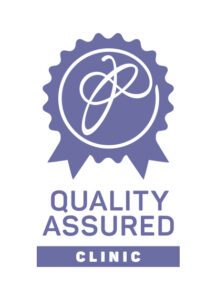Quality Assured Practitioner
QUALITY PHYSIOTHERAPY
Active Now Physiotherapy is proud to be have been awarded the prestigious title of “Quality Assured Clinic” from Physio First, the trade association for chartered physiotherapists in private practice, and Susannah holds a “Quality Assured Practitioner” qualification. This ground-breaking scheme, in conjunction with the University of Brighton, measures the quality of the physiotherapy you receive, and compares it to a national baseline. As one of the first clinics in the country to receive this award, Susannah is always looking to bring the most up to date, evidence-based treatment to you. She regularly attends post-graduate courses and conferences, and organises them for other physiotherapists too, sourcing the most relevant speakers on a wide range of clinical topics.
At your first appointment, you will be asked to give consent to be part of an on-line data collection project with the University of Brighton. It is from this information that the treatment outcomes are measured, and it provides the evidence for the Quality “kite mark”. You will also be asked to complete a short online questionnaire at the start and end of your treatment, usually via a link sent by email. This information goes directly to the University of Brighton and is tied to the information that Susannah sends. Your data set is then anonymised by the university.
This is contributing to a huge bank of data, which in time will be able to further shape and refine our treatments to give the best results based on the evidence of physiotherapists in private practice from across the country. There are currently 60,000 data sets, and these are being added to all the time. Active Now Physiotherapy is proud and excited to be contributing to this bank of knowledge.

The question:
When I’ve been to physio before, I’ve just been given some exercises – do you work differently?
The quick answer:
Yes, we regularly use a wide range of hands-on techniques, alongside exercises and general wellness advice.
For those who like detail:
Yes! Hands-on treatment is frequently used to increase movement range and change the resting tone of muscles and connective tissue. There is evidence that soft tissue techniques can change the centre of co-ordination of a muscle. It is believed that in some areas of the body when there is dysfunction, layers of soft tissues which should slide and glide over each other smoothly instead can become “glued” which affects load sharing and the way forces are transferred. These soft tissues are also vital to us being able to sense where we are in time and space, so-called proprioception and interoception. Soft tissue techniques to these areas are thought to restore normal gliding and improve function, restore normal feedback through the nerve endings and reduce pain in the process.
These hands-on techniques also create a “window of opportunity”, so that any follow up exercises given are to help maintain the changes and re-programme the movement patterns to a new “normal”. Some people need exercises to build strength if they have de-conditioned, and others to improve or maintain a range of movement. For others, they may have strength and range, but the co-ordination of the muscles to work in the right order at the right time can be the problem, and timing and co-ordination tasks to re-programme the brain’s movement control patterns may be needed.
The final part of the picture is that we do not exist as a body and brain controlling our movement system in isolation. We are, of course, influenced by other factors that are affecting how we feel. Imagine feeling nervous before an exam or driving test. You are aware not only of thoughts relating to the up-coming test, but also may notice butterflies in your stomach, and even have to go to the loo! It’s the same brain chemicals or neuro-transmitters that produce these sensations. In the same way but often more subtly, the other things going on in your life will affect how you move and process pain, such as job and home life stresses, and even your childhood experiences. These factors all go into making you, you! So will affect how you experience symptoms.
Our beliefs about our symptoms will also play a huge part in our day-to-day experience of pain. Imagine someone with back pain who thinks “my mother had awful back pain all through her life so I will probably too” versus “I just did a load of digging I don’t normally do, of course my back will hurt for a day or two and will then settle down”. You can see that the pain is going to be processed completely differently in these two examples. To get the best outcomes, here at Active Now Physio we have to consider all of you, body, mind and belief system!
